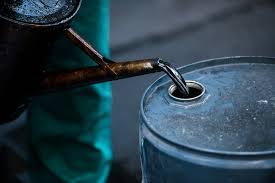Nigeria has cut the official selling prices for its crude oil to record lows to clear a glut of unsold April-loading cargoes before releasing the May programme on Monday.
The country has had to grapple with an unprecedented excess of oil triggered by the coronavirus outbreak and a price war between Saudi Arabia and Russia for market share.
The Nigerian National Petroleum Corporation cut its April official selling prices for Bonny Light and Qua Iboe by $5 per barrel to dated Brent minus $3.29 and minus $3.10 per barrel, respectively, Reuters reported on Monday.
Brent crude, the international benchmark, has fallen by over 60 per cent since the start of this year. It stood at $26.44 per barrel as of 7:40pm on Monday.
May loading programmes emerged with key grades seeing an increase over the previous month, Reuters reported on Monday.
Bonny Light and Forcados are both higher and due to load 245,000 barrels per day, Bonga 123,000 bpd and Qua Iboe 215,000 bpd.
There will also be two cargoes each of Usan and Yoho, five cargoes each of Brass River and Agbami, six of Egina and four Amenam, according to the report.
The Group Managing Director of the Nigerian National Petroleum Corporation, Mallam Mele Kyari, said recently that the country was already struggling to find buyers for its crude oil, saying over 50 cargoes were yet to be sold.
The unsold cargoes represented more than 70 per cent of the country’s total oil exports and puts the country in a very difficult spot, according to S&P Global Platts.
Kyari said Nigeria’s crude cargoes had been stranded due to the higher selling price compared with its fellow OPEC members such as Saudi Arabia and Iraq, which could afford to offer discounts of around $5 to $8 per barrel to buyers.
Oil crash forces Seplat, Shell to cut spending
In a related development, a major Nigerian independent oil and gas firm, Seplat Petroleum Development Company Plc, is looking to cut costs by at least 30 per cent to counter a crash in crude prices, its Chief Financial Officer, Roger Brown, has said.
Royal Dutch Shell, a global oil giant with huge presence in Nigeria, said on Monday that it would lower its capital spending for this year to $20bn or less, compared with its previously planned level of around $25bn.
The company also said it would reduce its operating costs by $3bn to $4bn a year over the next 12 months compared to 2019, as well as achieving “material reductions” in working capital.
Reuters quoted Seplat’s COO as saying on Monday that the company’s cuts, which would ideally be higher in the short term, would see its drilling plans reduced to three wells from the 15-20 it had planned.
The oil price, which has been under pressure from the coronavirus pandemic and the price war between Saudi Arabia and Russia, plunged to a record low of $24 per barrel last week.
“We are cutting back on capital expenditure quite significantly and focusing on higher, more prolific oil wells,” Brown said.
Seplat had hedged 60 per cent of its production at $45 per barrel through to the end of the third quarter. But Brown said the company needed to be prudent as oil prices could fall further.
“We don’t think we’ve hit the bottom of that yet,” he said of oil prices, adding, “It’s too early for us to call that.”
In the 2019 fiscal year, Seplat spent $125m on capital expenditures, including drilling nine development wells.


